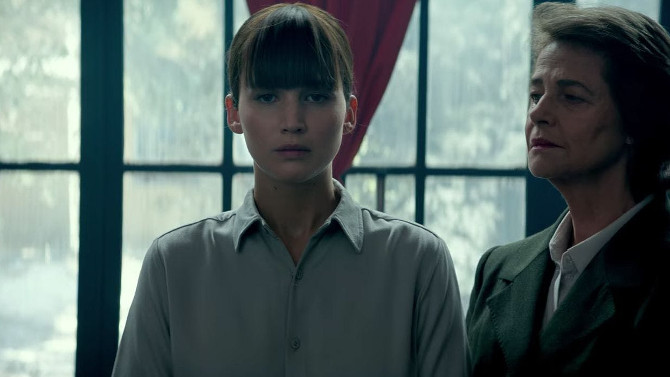If it was ever possible for a film to be of the wrong time as well as utterly relevant for its time, Francis Lawrence’s Red Sparrow would be it. Like a hybrid of a 1970’s B exploitation pic and Italian giallo thriller (it relishing in its moments of sadism, violence and nudity), at the same moment, it is a worthwhile vehicle for its female lead. Dealing with topics such as rape, revenge, retribution, and politics, its old-school style story-telling (with twenty-first century glossy filter) has likely pushed it to the fringes – with such issues ripping through Hollywood and American politics itself, it may be too close to home for many to enjoy.
A motion picture that would have thrived on the drive-in circuit back in the day, it is a twisty (and twisted) Machiavellian tale of spy-craft and game-playing. . . a dog eat dog, cutthroat world. Led by a daring performance from Jennifer Lawrence (reuniting with her Hunger Games director – that is, of films two, three, and four), she plays Dominika Egorova, a prima ballerina in Russia. After a horrible injury, she is left in a precarious position, as she does not have the money to support herself or her sickly mother, Nina (Joely Richardson).
In walks her uncle, Vanya (Matthias Schoenaerts), a man who has long been at a distance from his niece and sister-in-law. A Russian intelligence officer, he has an offer for Dominika, after all, he is a puppet master known for pulling strings from the safety of the shadows. Given an unusual task, it eventually leads her into the Sparrow School – a secret organization that trains men and women to be seductive, manipulative spies. . . able to root out a person’s deepest, sometimes darkest desires in order to infiltrate their lives.
Failure is not an option, as the School’s cold blooded Matron (Charlotte Rampling) is happy to put a bullet in the head of anyone who is not reaching their potential. The participants in the program are also under the watchful eye of the superiors of Vanya and Matron – General Korchnoi (Jeremy Irons) and Colonel Zakharov (Ciarán Hinds), as the Sparrows are a key piece of the puzzle – able to infiltrate almost any situation, doing everything from gathering information to killing. . . the perfect sleeper cells.
Like a complex chess match, each character makes their own well thought out move, keeping the audience guessing as to who is winning. . . and, even if it seems like someone does have the upper hand, it very well may just be one well-hidden trap. In this world of cunning deviousness, two-faced scheming, and unscrupulous manoeuvres, information is as important as currency, used to influence, manipulate, and stab in the back. With a mole somewhere in the Russian government, Dominika is tasked with entering this perfidious landscape. . . her mission (and unlike Ethan Hunt, she does not have any other option but to accept it): to make a connection with CIA operative Nate Nash (Joel Edgerton), the man believed to be running the informant.
The type of film that is rarely made anymore (other than by a few rogue filmmakers, think David Cronenberg’s Eastern Promises as a comparable), it is part anti-hero revenge tale, part spy games (somewhere between Atomic Blonde and Tinker, Tailor, Soldier Spy). With the ballerina aspect linking to Black Swan, the stresses in the family do not come from the mother like in the aforementioned film, but rather, the manipulative, ambitious uncle. And, it also has an arthouse aesthetic, a niche story that develops over two hours and nineteen minutes – not for the impatient moviegoer. Though I bandy about all of the features/genres as comparisons, it is really not like any of them either, its own chestnut somewhere in the middle. Also, as mentioned above, very little is held back: rape, torture, murder, violence and nudity permeate the piece. . . even incest is hinted at, moments of grizzly grit amongst the character driven story.
Much has been made about the Russian accents adopted by the cast, and though some waver, I would much rather listen to quasi-authenticity than hear another foreign set film with American/British accents. The actors deserve much credit for attempting this difficult proposition, and, for the most part, they succeed. It is here that I will also mention that Mary-Louise Parker has an entertaining cameo as a drunken chief of staff to a United States senator, an audacious scene with nice touches of suspense.
Likely to become a cult film, it is almost lamentable that this type of movie rarely gets made anymore. In an era of high end movie theatres that screen costly comic book popcorn flicks, lewd comedies, mindless action pictures and Oscar bait features, there is almost no room for edgy, daring, slow-burner, envelope pushing B movie fare like this anymore (I’m actually a bit surprised it got its sixty-nine million dollar budget). Now, having said all of this, Red Sparrow is by no means perfect. There are some small issues with pacing, editing and story, though the concluding twist is, at least to me, worth it – an intriguing (and rewarding), though implausible ending to the tale. It is also filled with visual flair, moments of striking cinematography (an early scene where the mole is almost caught is a prime example), and oodles of perverse intrigue. What will likely decide this film’s fate for each and every viewer is the perspective they analyse it with, but, if you just let it be the motion picture it is rather than scrutinizing it with a politically correct slant due to present circumstances, it is a unique kind of spy film. . . the Bolshoi Ballet it is not. So, answer the call; check out each and every frame of Red Sparrow, it hits enough of the right notes to say that it is worth giving it a shot.

